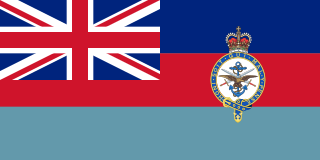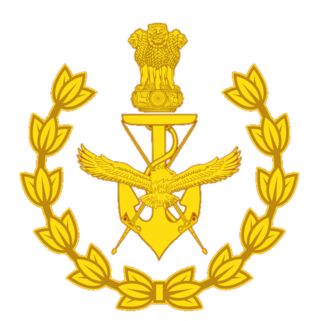
The Joint Chiefs of Staff (JCS) is the body of the most senior uniformed leaders within the United States Department of Defense, which advises the president of the United States, the secretary of defense, the Homeland Security Council and the National Security Council on military matters. The composition of the Joint Chiefs of Staff is defined by statute and consists of a chairman (CJCS), a vice chairman (VJCS), the chiefs of the Army, Marine Corps, Navy, Air Force, Space Force, and the chief of the National Guard Bureau. Each of the individual service chiefs, outside their JCS obligations, works directly under the secretaries of their respective military departments, e.g. the secretary of the Army, the secretary of the Navy, and the secretary of the Air Force.

The Ministry of Defence is the department responsible for implementing the defence policy set by His Majesty's Government, and is the headquarters of the British Armed Forces.

A commander in chief or supreme commander is the person who exercises supreme command and control over an armed force or a military branch. As a technical term, it refers to military competencies that reside in a country's executive leadership, a head of state, head of government, or other designated government official.

The First Sea Lord and Chief of the Naval Staff (1SL/CNS) is a statutory position in the British Armed Forces usually held by a four star admiral. As the highest-ranking officer to serve in the Royal Navy, the chief is the principal military advisor on matters pertaining to the navy and a deputy to the Secretary of State for Defence. In a separate capacity, the CNS is a member of the Chiefs of Staff Committee and, thereby, a military advisor to the National Security Council, the prime minister and the monarch. The First Sea Lord is typically the highest-ranking officer on active duty of the Royal Navy unless the Chief of the Defence Staff is a naval officer. Admiral Ben Key was appointed First Sea Lord in November 2021.

The Chief of the Defence Staff (CDS) is the professional head of the British Armed Forces and the most senior uniformed military adviser to the Secretary of State for Defence and the prime minister of the United Kingdom. The chief of the defence staff is based at the Ministry of Defence and works alongside the Permanent Under-Secretary of State for Defence, the ministry's senior civil servant. The Chief of Defence is the highest ranking officer to currently serve in the armed forces.

Defence Intelligence (DI) is an organisation within the United Kingdom intelligence community which focuses on gathering and analysing military intelligence. It differs from the UK's intelligence agencies in that it is an integral part of a government department – the Ministry of Defence (MoD) – rather than a stand-alone organisation. The organisation employs a mixture of civilian and military staff and is funded within the UK's defence budget. The organisation was formerly known as the Defence Intelligence Staff (DIS), but changed its name in 2009.
The title chief of staff identifies the leader of a complex organization such as the armed forces, institution, or body of persons and it also may identify a principal staff officer (PSO), who is the coordinator of the supporting staff or a primary aide-de-camp to an important individual, such as a president, or a senior military officer, or leader of a large organization.

The Chief of the General Staff (CGS) has been the title of the professional head of the British Army since 1964. The CGS is a member of both the Chiefs of Staff Committee and the Army Board; he is also the Chair of the Executive Committee of the Army Board. Prior to 1964, the title was Chief of the Imperial General Staff (CIGS). Since 1959, the post has been immediately subordinate to the Chief of the Defence Staff, the post held by the professional head of the British Armed Forces.

The chief of the Defence Staff is the professional head of the Canadian Armed Forces. As the senior military position, the chief of the Defence Staff advises the Cabinet, particularly the minister of national defence and the prime minister. The role is a Crown-in-Council appointment made by the viceroy on the advice of the prime minister.

The Chief of the Air Staff (CAS) is the professional head of the Royal Air Force and a member of both the Chiefs of Staff Committee and the Air Force Board. The post was created in 1918 with Major General Sir Hugh Trenchard as the first incumbent. The current and 30th Chief of the Air Staff is Air Chief Marshal Sir Richard Knighton, who succeeded Sir Michael Wigston on 2 June 2023.

Marshal of the Royal Air Force Sir William Forster Dickson,, was a Royal Naval Air Service aviator during the First World War, a senior officer in the Royal Air Force during the inter-war years and a Royal Air Force commander during and after the Second World War. Dickson was Chief of the Air Staff in the mid-1950s, in which role his main preoccupation was the establishment of the V Force and the necessary supporting weapons, airfields and personnel. He also served as the first Chief of the Defence Staff in the late 1950s.

The Joint Chiefs of Staff Committee (JCSC), ; is an administrative body of senior high-ranking uniformed military leaders of the unified Pakistan Armed Forces who advises the civilian Government of Pakistan, National Security Council, Defence Minister, President and Prime minister of Pakistan on important military and non-military strategic matters. It is defined by statute, and consists of a Chairman, the military chiefs from Army, Navy and the Air Force: all four-star officers appointed by the President, on the advice of the Prime minister. The chairman is selected based on seniority and merit from the Chiefs of service of the three branches of the Pakistan Armed and Defense Services. Each service chief, outside their Joint Chiefs of Staff obligations, performs their duty directly for the Ministry of Defence.

General John Nicholas Reynolds Houghton, Baron Houghton of Richmond, is a retired senior British Army officer and former Chief of the Defence Staff (CDS) of the British Armed Forces. He was appointed CDS in July 2013, following the retirement of General Sir David Richards. He served as Commanding Officer of the 1st Battalion, the Green Howards in Northern Ireland during The Troubles and later became Commander of the 39th Infantry Brigade in Northern Ireland. He deployed as Senior British Military Representative and Deputy Commanding General, Multi-National Force – Iraq during the Iraq War. Later, he became Chief of Joint Operations at Permanent Joint Headquarters and served as Vice-Chief of the Defence Staff until assuming the position of CDS. Houghton retired from the British Army in July 2016, and was succeeded as CDS by Air Chief Marshal Sir Stuart Peach.

General David Julian Richards, Baron Richards of Herstmonceux, is a retired senior British Army officer and Peer who was formerly the Chief of the Defence Staff, the professional head of the British Armed Forces. He succeeded Air Chief Marshal Sir Jock Stirrup in this role on 29 October 2010.

The Ministry of Defence (MoD) is charged with coordinating and supervising all agencies and functions of the government relating directly to national security and the Indian Armed Forces. The President of India is the ceremonial commander-in-chief of the armed forces of the country. The Ministry of Defence provides policy framework and resources to the armed forces to discharge their responsibility in the context of the defence of the country. The Indian Armed Forces and Indian Coast Guard under the Ministry of Defence are primarily responsible for ensuring the territorial integrity of India.

The Chief of the Defence Staff (CDS) is the most senior appointment in the Sri Lankan Armed Forces, and the highest-ranking military officer in service, outranking the heads of each service branch. The CDS does not, however, have operational command authority over service branches, but rather oversees inter-service co-operation and develops and implements the joint operations doctrine of the Sri Lankan armed forces. Coordination of inter-service joint operations are handled by the Office of the Chief of the Defence Staff formally known as the Joint Operations Headquarters.

Admiral Sir Antony David Radakin, is a senior Royal Navy officer. He has served as Chief of the Defence Staff, the professional head of the British Armed Forces, since November 2021. Radakin was previously the First Sea Lord, the professional head of the Naval Service from June 2019 to November 2021. He was Chief of Staff, Joint Forces Command, from 2016 to 2018, and the Second Sea Lord and Deputy Chief of the Naval Staff from 2018 to 2019. He was appointed Lord High Constable of England in 2023, and in that role took part in the Coronation of Charles III and Camilla.

The Chairman, Chiefs of Staff Committee is a position in the Indian Armed Forces, usually held by a four-star officer serving as the Chief of Defence Staff (CDS) of the Indian military. The position holder chairs the Chiefs of Staff Committee, and serves as the principal adviser to the prime minister and Minister of Defence. The position is not a statutory office but rather a title held by the senior most serving military officer of India. Until 2020, the chairmanship of the COSC was held in rotation by the senior-most service chief until his retirement, but this arrangement was found to be unsatisfactory. Thus, when the post of the CDS was established, its holder was also made the permanent Chairman COSC.

The Chief of Defence Staff of the Indian Armed Forces (CDS) is the professional head and permanent Chairman of the Chiefs of Staff Committee (COSC) of the Indian Armed Forces. The Chief of Defence Staff is the highest-ranking uniformed officer on active duty in the Indian military and chief military adviser to the Minister of Defence and principle military advisor to the Government. The Chief also heads the Department of Military Affairs. The CDS is assisted by a vice-chief of defence staff

Department of Military Affairs (DMA) is the department in charge of military matters within the Indian Ministry of Defence. Headed by the Chief of Defence Staff, as its ex-officio secretary, the DMA provides integration between the armed forces of the Union and the Ministry of Defence.






























